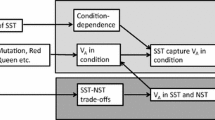Abstract
The theoretical possibility of sympatric speciation by sexual selection has been demonstrated by a number of mathematical models. Although these models assumed that sexually selected traits are additively determined by many genes, recent empirical studies suggest that many sexually selected traits are determined by major gene inheritance. Thus, using a mathematical simulation model, this article examines whether sympatric speciation by sexual selection can occur when sexually selected traits are determined by major gene inheritance. The model reveals that speciation can occur with major gene inheritance of sexually selected traits. Simulations show that speciation from an initially monomorphic population occurs via two successive Fisher's runaway processes of sexual selection. The first runaway causes the unidirectional evolution of male secondary sexual character toward one extreme in the trait space and of female mate preference for such a character. The second runaway then drives the male character and female preference of a part of the population toward the other extreme in the trait space, splitting the population into two reproductively isolated subgroups. The current results reinforce the plausibility of sympatric speciation by sexual selection.
Similar content being viewed by others
Author information
Authors and Affiliations
Additional information
Received: January 30, 2002 / Accepted: June 27, 2002
Rights and permissions
About this article
Cite this article
Takimoto, G. Polygenic inheritance is not necessary for sympatric speciation by sexual selection. Popul Ecol 44, 87–91 (2002). https://doi.org/10.1007/s101440200010
Issue Date:
DOI: https://doi.org/10.1007/s101440200010




